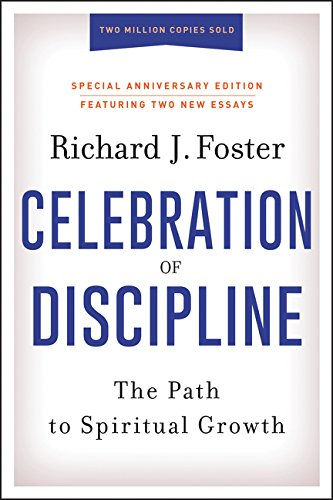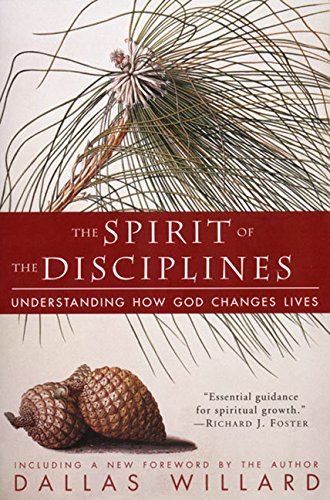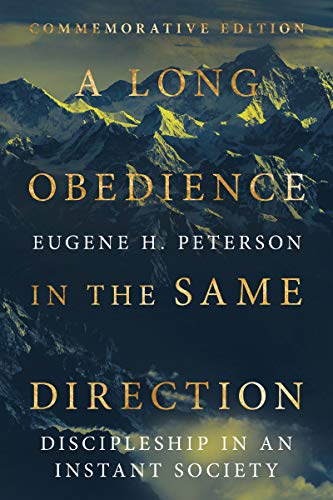
1

2

3

4

5
There are so many opinions about what works and what doesn’t in leading Christians to behave and think like Jesus. Most people spend the majority of their lives just trying to keep up with their responsibilities while most pastors use fundamentally flawed approaches.
1
First, we have to start out with a goal. If we want to figure out what it looks like to get to the finish line, we need one. Practicing Christian Doctrine lays out a way of thinking and living Christian faith that is profoundly grounded in Jesus' life while also helping us to continue theologically into modern times.
2
Next we need a map of the path. Spiritual Formation is at its roots about forging a path from secular life to Christ-likeness. Jesus laid out a method of connection to His Father that is at its roots about habits filled with expectation. When you are on the path where God says He'll show up, you are simply more likely to find Him.
3
This book provides the heart behind the process, the food for the trail of spiritual formation. "Discipline" as a word is on-brand for Christian faith, but certainly lacks the sex-appeal of the things that typically receive our attention. As one of the most-beloved Christian authors of the last century, Willard gives us exactly what is needed as we begin to practice a life of Christ-likeness. If you find yourself lacking enthusiasm, this is a great place to start!
4
In nearly all Christian churches, people are taught what to believe in hopes they will begin to live accordingly. This approach is fundamentally and permanently flawed. Rather than beginning with teaching, true spiritual formation begins with practice. This is the essence of discipleship and one that is woefully missed in Western Christianity. In his book "Atomic Habits," James Clear lays out a path for changing habits generally. When applied to faith formation, this text gives powerful tools for actually helping people transform their habits and therefore their beliefs.
5
If Foster gives us a map of the path, Eugene Peterson here gives us a sketchbook of the journey. Peterson provides us with a beautiful expression of his life with God through one deep and focussed discipline. In this, one of Peterson's best works, he presents us with laser focus on the most transcendent of Christian practices--prayer. He utilizes rich Biblical language to provide readers with a way of doing the disciplines that is life giving and personal. Rather than presenting us with a pseudo-christian microwaved faith, Peterson helps us to realize that we have our whole lives to grow in Christ-likeness. If we approach each of the disciplines with this heart, we will truly be forever changed.

1
First, we have to start out with a goal. If we want to figure out what it looks like to get to the finish line, we need one. Practicing Christian Doctrine lays out a way of thinking and living Christian faith that is profoundly grounded in Jesus' life while also helping us to continue theologically into modern times.

2
Next we need a map of the path. Spiritual Formation is at its roots about forging a path from secular life to Christ-likeness. Jesus laid out a method of connection to His Father that is at its roots about habits filled with expectation. When you are on the path where God says He'll show up, you are simply more likely to find Him.

3
This book provides the heart behind the process, the food for the trail of spiritual formation. "Discipline" as a word is on-brand for Christian faith, but certainly lacks the sex-appeal of the things that typically receive our attention. As one of the most-beloved Christian authors of the last century, Willard gives us exactly what is needed as we begin to practice a life of Christ-likeness. If you find yourself lacking enthusiasm, this is a great place to start!

4
In nearly all Christian churches, people are taught what to believe in hopes they will begin to live accordingly. This approach is fundamentally and permanently flawed. Rather than beginning with teaching, true spiritual formation begins with practice. This is the essence of discipleship and one that is woefully missed in Western Christianity. In his book "Atomic Habits," James Clear lays out a path for changing habits generally. When applied to faith formation, this text gives powerful tools for actually helping people transform their habits and therefore their beliefs.

5
If Foster gives us a map of the path, Eugene Peterson here gives us a sketchbook of the journey. Peterson provides us with a beautiful expression of his life with God through one deep and focussed discipline. In this, one of Peterson's best works, he presents us with laser focus on the most transcendent of Christian practices--prayer. He utilizes rich Biblical language to provide readers with a way of doing the disciplines that is life giving and personal. Rather than presenting us with a pseudo-christian microwaved faith, Peterson helps us to realize that we have our whole lives to grow in Christ-likeness. If we approach each of the disciplines with this heart, we will truly be forever changed.
© Five Books 2026